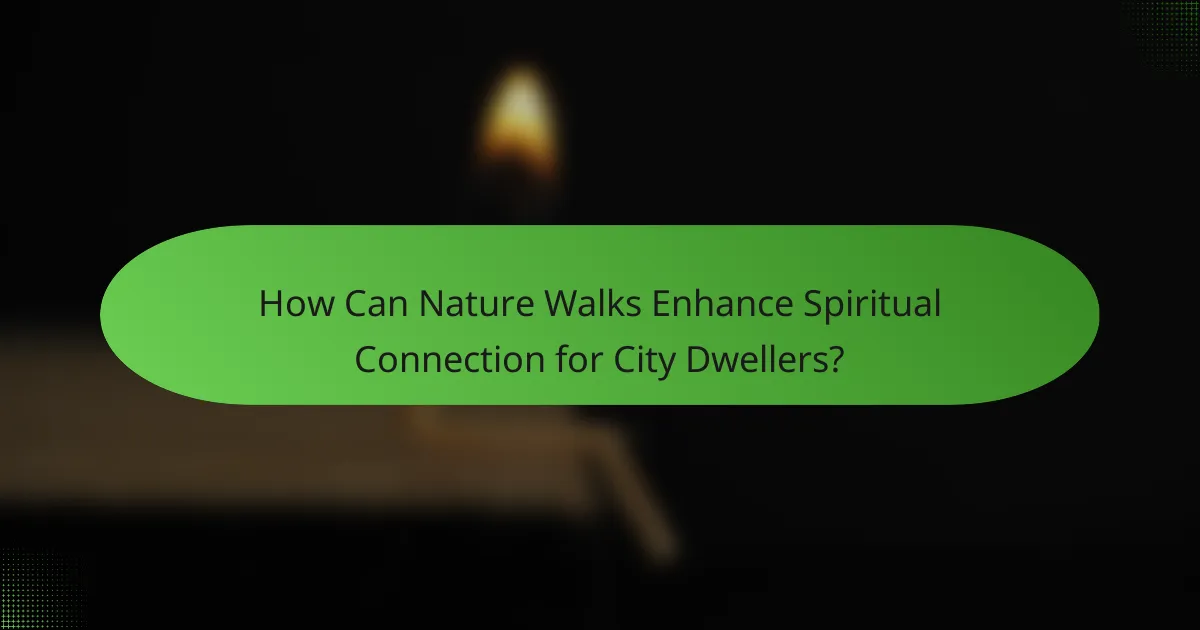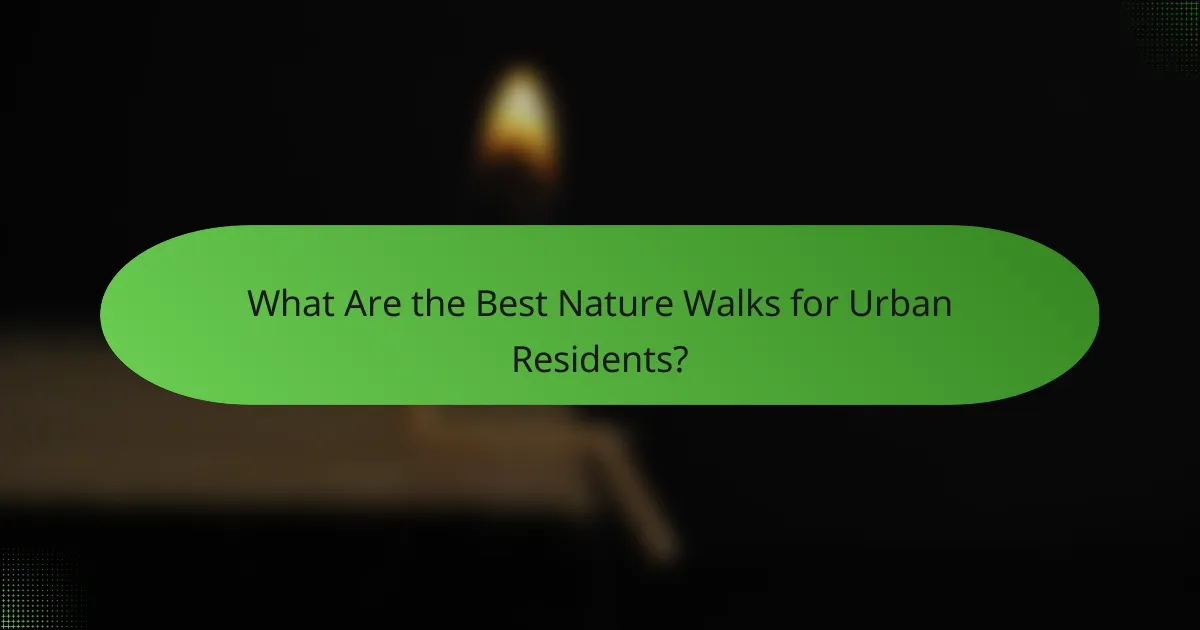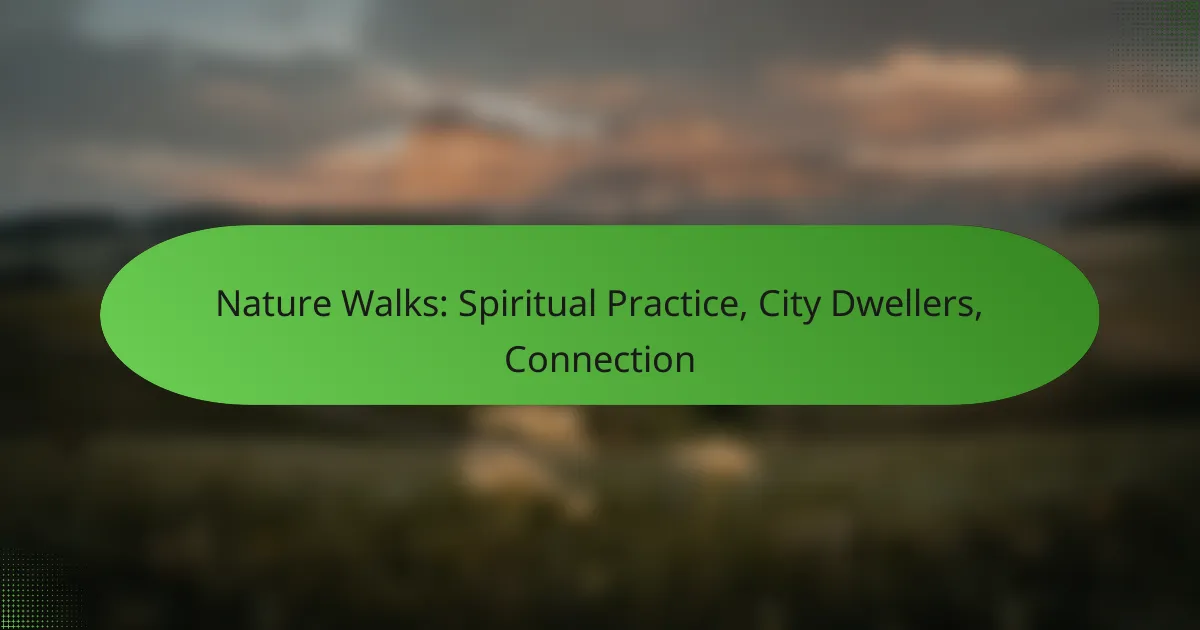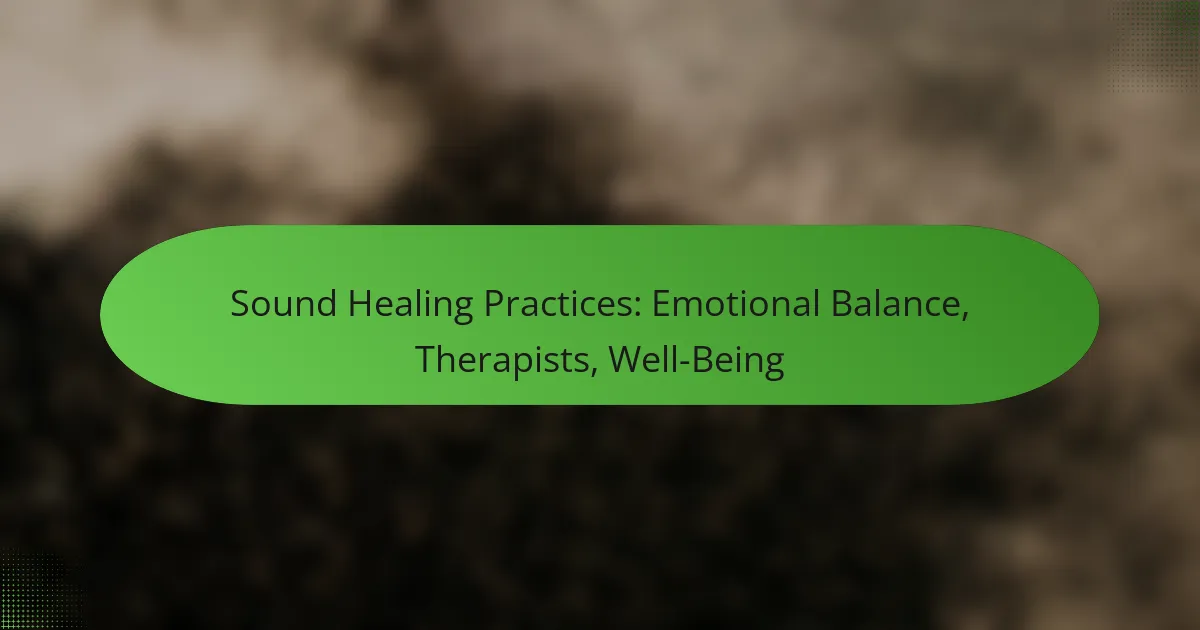Nature walks offer city dwellers a unique opportunity to cultivate spiritual connection amidst the urban landscape. By stepping into green spaces, individuals can escape the chaos of city life, fostering mindfulness and reflection while reconnecting with their inner selves. Incorporating these walks into daily routines can significantly enhance well-being and deepen one’s bond with the environment.

How Can Nature Walks Enhance Spiritual Connection for City Dwellers?
Nature walks can significantly enhance spiritual connection for city dwellers by providing a serene environment that fosters mindfulness and reflection. Engaging with natural surroundings allows individuals to step away from urban distractions and reconnect with their inner selves.
Mindfulness through nature
Mindfulness in nature involves being fully present and aware of the sights, sounds, and sensations around you. This practice can reduce stress and promote a sense of peace, making it easier to connect with spiritual feelings. Simple activities like observing the movement of leaves or listening to birds can ground you in the moment.
To cultivate mindfulness during your walks, try focusing on your breath and the rhythm of your steps. Aim for a slow pace that allows you to absorb your surroundings, which can enhance your overall experience and deepen your spiritual connection.
Grounding techniques
Grounding techniques help you establish a connection with the earth, which can be particularly beneficial for city dwellers. Techniques such as walking barefoot on grass or soil can create a physical link to nature, promoting feelings of stability and calm. This practice can help alleviate anxiety and foster a sense of belonging.
Consider incorporating grounding exercises into your nature walks, such as standing still and feeling the ground beneath your feet or leaning against a tree. These actions can enhance your awareness of the natural world and reinforce your spiritual connection.
Reflection and meditation opportunities
Nature walks provide an ideal setting for reflection and meditation, allowing for deeper introspection. The tranquility of natural environments can encourage thoughts and insights to surface, making it easier to connect with your spiritual beliefs. Find a quiet spot to sit and reflect on your experiences or meditate on specific questions or intentions.
To maximize these opportunities, bring a journal to jot down thoughts or feelings that arise during your walk. Setting aside time for meditation amidst nature can help solidify your spiritual practice and deepen your connection to the world around you.

What Are the Best Nature Walks for Urban Residents?
Urban residents can find rejuvenating nature walks in city parks that offer a blend of tranquility and natural beauty. These green spaces provide an escape from the hustle and bustle, allowing individuals to reconnect with nature without leaving the city.
Central Park, New York City
Central Park is a sprawling oasis in the heart of Manhattan, covering over 840 acres. With numerous walking paths, scenic views, and diverse landscapes, it offers a perfect retreat for city dwellers. Popular spots include the Bethesda Terrace and the Ramble, where visitors can enjoy peaceful strolls surrounded by nature.
When walking in Central Park, consider visiting during weekdays to avoid crowds. Early mornings or late afternoons provide a quieter experience, ideal for reflection or meditation amidst the greenery.
Golden Gate Park, San Francisco
Golden Gate Park spans over 1,000 acres and features a variety of gardens, lakes, and walking trails. It is home to attractions like the Japanese Tea Garden and the Conservatory of Flowers, making it a rich environment for exploration. The park’s diverse ecosystems allow for a unique experience with each visit.
To make the most of your walk, plan a route that includes both popular attractions and hidden gems. Bring a picnic to enjoy in one of the many open spaces, enhancing your connection to the natural surroundings.
Hyde Park, London
Hyde Park is one of London’s largest and most famous parks, offering 350 acres of greenery and recreational areas. Visitors can enjoy serene walks along the Serpentine Lake or through the beautiful flower gardens. The park is also a cultural hub, hosting events and exhibitions throughout the year.
For a fulfilling experience, consider joining a guided nature walk or participating in park events. These activities can deepen your appreciation for the park’s history and ecology while providing an opportunity to meet fellow nature enthusiasts.

How to Incorporate Nature Walks into Daily Life?
Incorporating nature walks into daily life can enhance your well-being and foster a deeper connection with the environment. By scheduling regular walks, joining local nature groups, and utilizing apps for guided experiences, you can easily make nature a part of your routine.
Scheduling regular walks
To effectively integrate nature walks into your daily life, start by scheduling them into your calendar. Aim for at least two to three walks per week, ideally during times when you can enjoy the natural light, such as early mornings or late afternoons.
Consider setting reminders on your phone or using a planner to keep you accountable. Choose local parks or green spaces that are easily accessible, and vary your routes to keep the experience fresh and engaging.
Joining local nature groups
Joining local nature groups can provide motivation and a sense of community. Look for organizations in your area that focus on outdoor activities, conservation, or guided walks. Participating in group events can introduce you to new trails and enhance your appreciation for nature.
Many cities have community boards or social media groups where you can find information about upcoming nature walks or volunteer opportunities. Engaging with others who share your interests can deepen your connection to the environment and encourage regular participation.
Using apps for guided walks
Utilizing apps designed for guided nature walks can enhance your experience and provide valuable information about the flora and fauna you encounter. Many apps offer features such as GPS navigation, educational content, and suggested routes based on your location.
Popular apps like AllTrails or iNaturalist can help you discover new trails and track your progress. When using these apps, ensure your device is charged and consider downloading maps for offline use to avoid connectivity issues in remote areas.

What Are the Benefits of Nature Walks for Mental Health?
Nature walks offer significant benefits for mental health by reducing stress, improving mood, and enhancing creativity. Engaging with natural environments can lead to a more positive mental state and overall well-being.
Reduced stress levels
Walking in nature can significantly lower stress levels. Exposure to green spaces has been shown to decrease cortisol, the stress hormone, helping individuals feel more relaxed and centered.
To maximize stress reduction, aim for regular walks in parks or natural reserves, ideally for at least 30 minutes. The sights and sounds of nature can create a calming effect, making it easier to unwind.
Improved mood and well-being
Nature walks can lead to improved mood and overall well-being. Studies indicate that spending time outdoors can elevate serotonin levels, which are linked to feelings of happiness and contentment.
Consider incorporating nature walks into your routine, especially during sunny days. Even short walks can enhance your mood and provide a refreshing break from daily stressors.
Enhanced creativity
Engaging with nature can boost creativity and problem-solving skills. Being in a natural setting allows the mind to wander freely, which can lead to new ideas and perspectives.
To foster creativity, try taking a walk in a natural area without distractions. Leave your phone behind and allow your thoughts to flow, which can lead to innovative insights and solutions.

What Should You Look for in a Nature Walk Experience?
When seeking a nature walk experience, consider factors like accessibility, whether you prefer guided or self-led options, and the safety of the environment. These elements can significantly enhance your connection to nature and ensure a fulfilling experience.
Accessibility and location
Accessibility is crucial for a satisfying nature walk. Look for trails that are easy to reach by public transport or car, and consider the terrain’s suitability for your fitness level. Urban parks or nature reserves within a short drive or a reasonable walking distance are often ideal for city dwellers.
Check if the trails are wheelchair-friendly or have amenities like restrooms and parking. Websites or local guides often provide detailed information on trail conditions and accessibility features.
Guided vs. self-led options
Choosing between guided and self-led nature walks depends on your preferences and experience level. Guided walks offer expert insights and can enhance your understanding of local flora and fauna, making them ideal for beginners or those seeking a deeper connection.
Self-led walks provide flexibility and solitude, allowing you to explore at your own pace. Consider downloading trail maps or using apps that offer information on points of interest to enrich your experience.
Safety and environmental conditions
Prioritize safety by checking weather conditions and trail advisories before heading out. Be aware of local wildlife and potential hazards, such as steep paths or unstable ground. Dress appropriately for the weather and wear suitable footwear to prevent accidents.
Environmental conditions can vary greatly, so familiarize yourself with the area’s climate and seasonal changes. Always carry essentials like water, snacks, and a first-aid kit to ensure a safe and enjoyable outing.

How Do Nature Walks Foster Community Among City Dwellers?
Nature walks create opportunities for city dwellers to connect with each other and their environment, fostering a sense of community. By engaging in shared experiences outdoors, individuals can build relationships, participate in local initiatives, and enhance their overall well-being.
Building social connections
Nature walks encourage social interactions among participants, helping to break down barriers often present in urban settings. As people walk together, they can share stories, discuss common interests, and form friendships that extend beyond the trails.
To maximize social connections, consider joining or organizing group walks through local parks or nature reserves. Look for community boards or social media groups that promote walking events, as these can be excellent platforms for meeting like-minded individuals.
Participating in local events
Many cities host organized nature walks and outdoor events that invite residents to explore their surroundings while engaging with their community. These events often include guided tours, clean-up initiatives, or educational workshops that highlight local flora and fauna.
To get involved, check local event calendars or websites dedicated to community activities. Participating in these events not only enhances your connection to nature but also strengthens ties with fellow city dwellers who share a passion for the environment.



